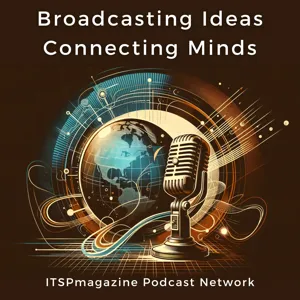Guest: Jeffrey Scheuer, Writer/Independent Scholar
On LinkedIn | https://www.linkedin.com/in/jeffrey-scheuer-82443697/
_____________________________
Host: Marco Ciappelli, Co-Founder at ITSPmagazine [@ITSPmagazine] and Host of Redefining Society Podcast
On ITSPmagazine | https://www.itspmagazine.com/itspmagazine-podcast-radio-hosts/marco-ciappelli
_____________________________
This Episode’s Sponsors
BlackCloak 👉 https://itspm.ag/itspbcweb
Bugcrowd 👉 https://itspm.ag/itspbgcweb
Devo 👉 https://itspm.ag/itspdvweb
_____________________________
Episode Introduction
Welcome to this thought-provoking episode of the Redefining Society Podcast with your host, Marco Ciappelli. Prepare to dive deep into a compelling conversation that investigates the very bedrock of society — education. Is there something fundamentally amiss with how we're imparting knowledge to the next generation? Are we teaching them how to learn and critically think about what they're learning? Listen in as we explore these burning questions and more.
In this episode, Marco engages in a riveting conversation with Jeffrey Scheuer, the author of "Inside the Liberal Arts: Critical Thinking and Citizenship." A book that ambitiously endeavors to merge the realms of liberal arts, critical thinking, and citizenship into a comprehensive whole in just under 200 pages. Jeffrey takes on the challenge of explicating the elusive nature of liberal arts, critical thinking, and their inherent connections, a task rarely undertaken in earnest.
As you listen, contemplate Marco's ethos: he's not here to provide definitive answers but to encourage his audience to ponder different perspectives and cultivate their own thoughts. In a world where the term 'liberal' has become so politically charged, Jeffrey offers clarity by tracing its roots back to ancient Rome. 'Liberal arts,' he posits, originally meant 'the skills of a free citizen of the Roman Republic,' and miraculously, still carries that connotation. It's about citizenship, about the transactions between the individual and the community, and this conversation delves into what it truly means to be a good citizen.
Today, in the age of information overload and evolving technological landscapes, are the education and media industries keeping pace? Are they fostering informed, enlightened citizens or merely consumers of information? What's the role of critical thinking in navigating the ceaseless waves of data and stimuli we encounter daily?
Join us as we discuss these fascinating topics and more. Let's redefine society together. If this conversation makes you think, Marco has done his job. Share your thoughts, spread the conversation, and make sure to subscribe to the Redefining Society Podcast for more insightful discussions. Remember, we're here not just to consume information, but to critically think, engage, and shape the world around us. Let's start the journey.
About the Book
Inside the Liberal Arts: Critical Thinking and Citizenship answers three highly topical and related questions:
- What are the liberal arts?
- What is critical thinking?
- How are they connected?
At a time when liberal education is on the defensive vis à vis the STEM disciplines, and its future is called into question, the terms ‘liberal arts’ and ‘critical thinking’ are often used in tandem but seldom explained. Inside the Liberal Arts provides an overview of the core ideas that enable students to become higher-level thinkers. Avoiding the excesses of much academic prose (narrowness of focus, turgidity, obscure and unnecessary terminology, the pretention of absolute authority, and over-sourcing), Inside the Liberal Arts answers the three questions above, for students, educators, and the wider community of aspiring critical thinkers. It is at once a deep exploration of the concept of the liberal arts, and an accessible, thought-provoking guide to critical inquiry for students, prospective students, graduate students, former students, adult learners, parents, and anyone interested in liberal learning.
Defenders of the liberal arts perennially mention the importance of liberal learning to critical thinking and to citizenship. But there is no work that systematically explores the meaning of those ideas and how the liberal arts, critical thinking, and citizenship interconnect. As Mark Twain purportedly said of the weather: everyone complains about it, but nobody does anything about it.
Inside the Liberal Arts: Critical Thinking and Citizenship does something about it.
Examining the meaning of the term “liberal arts” and its roots in Greek and Roman thought, it goes on to explain how critical thinking unifies the modern liberal arts curriculum. As such, it is both an exploration of the nature of liberal learning and, integral to that, an accessible introduction to higher-level critical thinking for students, educators, and general readers.
While Inside the Liberal Arts presents multiple themes and concepts, an overarching idea is that citizenship is essentially triangular, embracing civic, economic, and cultural dimensions that interrelate, and that the value of liberal education lies in preparing students for all three forms of citizenship.
Inside the Liberal Arts distills four literatures: studies of the liberal arts; general books on thinking for lay readers; works on critical thinking; and philosophy. Its twin purposes are inseparable: to show how liberal learning promotes robust triangular citizenship, and to explain the concepts and ways of thinking that inform it. As a study of the role of thought in higher education, Inside the Liberal Arts addresses both general and academic readers in a way that will be both timely and enduring.
_____________________________
Resources
Inside the Liberal Arts: Critical Thinking and Citizenship (Book): https://jeffreyscheuer.com/insidetheliberalarts
____________________________
To see and hear more Redefining Society stories on ITSPmagazine, visit:
https://www.itspmagazine.com/redefining-society-podcast
Watch the webcast version on-demand on YouTube: https://www.youtube.com/playlist?list=PLnYu0psdcllTUoWMGGQHlGVZA575VtGr9
Are you interested in sponsoring an ITSPmagazine Channel?
👉 https://www.itspmagazine.com/advertise-on-itspmagazine-podcast









